|
|
|
Sort Order |
|
|
|
Items / Page
|
|
|
|
|
|
|
| Srl | Item |
| 1 |
ID:
138302
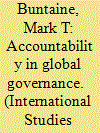

|
|
|
|
|
| Summary/Abstract |
International organizations frequently lack accountability to both states and civil society groups. States often face difficulties monitoring the actions of international organizations. Civil society groups do not often enjoy direct influence over decision-making within international organizations. To address these challenges, states have created accountability mechanisms for international organizations. Accountability mechanisms allow civil society groups to submit complaints about the performance of international organizations. They take the form of ombudsmen offices, accountability panels, and complaint procedures. Little is known about when and why these mechanisms constrain behavior by international organizations that runs counter to the mutual interests of states and civil society groups. Using the World Bank Inspection Panel as a test case, I show that monitoring by civil society groups alters lending at the World Bank when it enhances oversight by powerful states. By combining their abilities in sanctioning and monitoring, states and civil society groups can promote accountability at international organizations.
|
|
|
|
|
|
|
|
|
|
|
|
|
|
|
|
| 2 |
ID:
107222
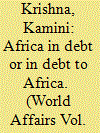

|
|
|
| 3 |
ID:
119662
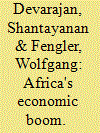

|
|
|
|
|
| Publication |
2013.
|
| Summary/Abstract |
Sub-Saharan Africa's GDP has grown five percent a year since 2000 and is expected to grow even faster in the future. Although pessimists are quick to point out that this growth has followed increases in commodities prices, the success of recent political reforms and the increased openness of African societies give the region a good chance of sustaining its boom for years to come.
|
|
|
|
|
|
|
|
|
|
|
|
|
|
|
|
| 4 |
ID:
099416
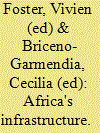

|
|
|
|
|
| Publication |
Washington, DC, World Bank, 2010.
|
| Description |
xxii, 355p.
|
| Standard Number |
9780821380413
|
|
|
|
|
|
|
|
|
|
|
|
Copies: C:1/I:0,R:0,Q:0
Circulation
| Accession# | Call# | Current Location | Status | Policy | Location |
| 055318 | 363.6096/FOS 055318 | Main | On Shelf | General | |
|
|
|
|
| 5 |
ID:
148031
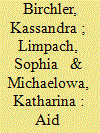

|
|
|
|
|
| Summary/Abstract |
Many argue that autocratic regimes allocate revenues from foreign aid with the aim of stabilizing their rule rather than serving economic and social development. However, donors often condition foreign aid on reforms in recipient states. We argue that when those conditions for reform focus on participative processes and government accountability, they positively affect democratization. We evaluate our claim based on different types of World Bank and IMF lending programs for a panel of 100 low- and middle-income countries over the years 1980–2011. Our results suggest that aid positively affects democratization when it strengthens domestic accountability mechanisms and thereby reduces its fungibility for recipients. The World Bank and the IMF’s poverty reduction strategy programs provide a notable case of this effect.
|
|
|
|
|
|
|
|
|
|
|
|
|
|
|
|
| 6 |
ID:
094722
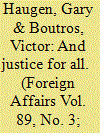

|
|
|
|
|
| Publication |
2010.
|
| Summary/Abstract |
International norms and legal codes that are meant to protect human rights mean little for people in the developing world, who suffer abuse not for a lack of laws but because these laws are not enforced. It is imperative, therefore, that the human rights community build up political will and capacity among local law enforcement bodies.
|
|
|
|
|
|
|
|
|
|
|
|
|
|
|
|
| 7 |
ID:
106906
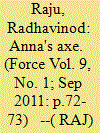

|
|
|
| 8 |
ID:
116883
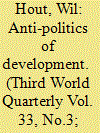

|
|
|
|
|
| Publication |
2012.
|
| Summary/Abstract |
This article discusses the attempt undertaken by several development aid agencies since the turn of the century to integrate political economy assessments into their decision making on development assistance. The article discusses three such attempts: the Drivers of Change adopted by the UK's Department for International Development, the Strategic Governance and Corruption Analysis (sgaca) developed by the Dutch Directorate General for International Cooperation and the new thinking on political economy analysis, policy reform and political risk advanced by the World Bank. On the basis of a political-economic interpretation of development agencies, two main factors are found to hinder the successful application of political economy assessment. In the first place, the agencies' professional outlook leads them to see development in primarily technical terms. In the second place, the nature of incentives for development professionals leads them to resist the implementation of political economy analyses.
|
|
|
|
|
|
|
|
|
|
|
|
|
|
|
|
| 9 |
ID:
095163
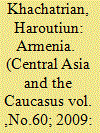

|
|
|
|
|
| Publication |
2009.
|
| Summary/Abstract |
The world crisis interrupted the stable economic growth Armenia had been enjoying for the past fifteen years. Progressive development began in 1994, whereby between 2001 and 2007 the growth indices reached double digits. In 2008, the increase in GDP came to a halt due to the Russian-Georgian war and amounted to only 6.8%. And as early as the first six months of 2009, the GDP began to decrease, dropping as low as 16.3% compared to the same period of the previous year, which is one of the worst indices for the entire CIS. In July, the drop in GDP amounted to 18.7%, which encouraged people to think that the crisis had bottomed out.
|
|
|
|
|
|
|
|
|
|
|
|
|
|
|
|
| 10 |
ID:
135541
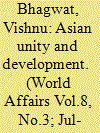

|
|
|
|
|
| Summary/Abstract |
The winding down of colonial empires in the middle of the twentieth century was greeted by a wave of revolutionary and reformist idealism in the newly liberated countries of the third world. many international agencies and movements rose to address the inequalities and injustices inherited from the old system but a reaction from the dominant former imperial powers managed to block or reverse that evolution and establish a subtler neo-colonial exploitative regime through the mechanism of globalization enforced by the petrodollar reserve currency, major banks and multinational corporations. Today various international associations such as ALBA, ASEAN, and BRICS are developing alternatives to the hegemonic Euro-American order.
|
|
|
|
|
|
|
|
|
|
|
|
|
|
|
|
| 11 |
ID:
131424
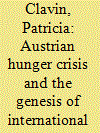

|
|
|
|
|
| Publication |
2014.
|
| Summary/Abstract |
From its foundation in 1918, the new Austrian republic was gripped by famine and a crisis of confidence in its currency that threatened to tip the new state into hyperinflation and revolution. This article shows how western efforts to aid Austria combat famine and its financial crisis were linked, and how they had a profound impact on the new League of Nations, the world's first multi-purpose intergovernmental organization. It also demonstrates the importance of the incipient wartime international bureaucracy for League agency. Contrary to the expectations of its architects, member governments, international financiers, businessmen and economists began to see the League as a useful tool to meet common needs that today would be called the search for human security. The article demonstrates how the Austrian food and financial crisis was the founding moment in the institutionalization of international economic and financial coordination, cooperation and oversight. It established the Economic and Financial Organization of the League of Nations, whose work would later inform its successors, the International Monetary Fund, the World Bank and the European Union. The study speaks to the ways in which the notion of security has broadened in the past two decades to embrace economic, social, political and environmental concerns. But the notion of 'human security' is not new; it was written into the body of the League.
|
|
|
|
|
|
|
|
|
|
|
|
|
|
|
|
| 12 |
ID:
096053
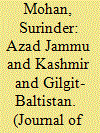

|
|
|
| 13 |
ID:
185557
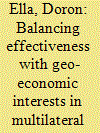

|
|
|
|
|
| Summary/Abstract |
Since its inception in December of 2015, scholars and policy-makers have been debating the motivations behind the design of the AIIB. This paper advances this debate by exploring whether and how the AIIB’s structure follow the design pattern of other leading MDBs, and how well did it manage to integrate institutional effectiveness considerations with promoting its largest shareholders’ geo-economic interests. It does so by comparing the design of the AIIB with that of the ADB and the World Bank, while integrating several approaches to institutional design. I argue that the AIIB’s architects identified certain functional deficiencies in the performance of existing financial institutions and attempted to establish an alternative that will better address these deficiencies. To achieve that, they tried to balance between certain structural features that promote institutional performance with features that promote powerful creditors’ geo-economic interests, as well as invest in AIIB’s attractiveness vis-à-vis other financial institutions. This paper finds that in multilateral development banks power considerations tend to overshadow issues of institutional effectiveness, while sometimes these are successfully integrated. And, that powerful actors are able to politicize certain functional design features and reassign their purpose from solving cooperation problems to advancing geo-economic interests.
|
|
|
|
|
|
|
|
|
|
|
|
|
|
|
|
| 14 |
ID:
104443
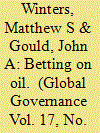

|
|
|
|
|
| Publication |
2011.
|
| Summary/Abstract |
Can international donors ensure that poor countries spend their natural resource revenues on development? This article reviews the Chad-Cameroon Oil Pipeline Project and the World Bank's fourteen-year effort to foster pro-poor expenditure of resource revenues in Chad. The World Bank used its leverage as a gatekeeper of private sector oil investment to write fiscal restrictions and extragovernmental oversight into Chadian law. These efforts, however, were not sufficient to overcome the country's poor governance and weak political accountability. The article argues that external donor efforts to build better governance in undemocratic states are unlikely to overcome resource curse and obsolescing bargain dynamics. They may even do more harm than good. The article recommends that the World Bank implement the 2003 Extractive Industry Review suggestion to cease investing in oil production. If the Bank does continue to lend to countries like Chad, it must ensure that it retains leverage across the life of the project in order to achieve its goals.
|
|
|
|
|
|
|
|
|
|
|
|
|
|
|
|
| 15 |
ID:
123229
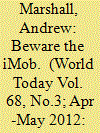

|
|
|
| 16 |
ID:
106421
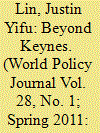

|
|
|
|
|
| Publication |
2011.
|
| Summary/Abstract |
In May 1979, Justin Yifu Lin—a 26-year-old company commander in the army of the Republic of China and a recent graduate of the MBA program at National Chengchi University-defected from Taiwan to mainland China by swimming across the straits to Fujian Province, leaving behind his pregnant wife and three-year-old child. Seven years later, after obtaining a Master's degree in Marxist political economy from Peking University, he became one of the first citizens of the People's Republic of China to receive a PhD in economics from the University of Chicago. Reunited with his family, and returning to China, he became a professor of economics at Peking University and founded the Beijing-based China Center for Economic Research. In June 2008, he became the chief economist of the World Bank, the first ever from a developing country. In a conversation with World Policy Journal editor David A. Andelman and managing editor Justin Vogt, Lin explained his vision of the global recovery and the role of the World Bank in helping developing nations grow and prosper.
|
|
|
|
|
|
|
|
|
|
|
|
|
|
|
|
| 17 |
ID:
064782
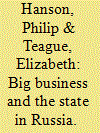

|
|
|
| 18 |
ID:
133453
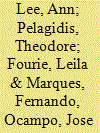

|
|
Big question: how much confidence do you have in your nation's banking system?
/ Lee, Ann; Pelagidis, Theodore; Fourie, Leila; Marques, Fernando, Ocampo, Jose Antonio, Antonini, Massimo, Naik, Prithvi, Britto, Neil
|

|
|
|
|
| Publication |
2014.
|
| Summary/Abstract |
The global banking system is the fundamental conduit of value within nations and across borders. Since the last global financial crisis, however, the role of banks as a repository of value has come increasingly into question. Today, with a fragile recovery in so much of the world, banks and those who manage and regulate them are under attack. We asked our panel of global experts how this crisis of confidence is playing out in their nation or region.
|
|
|
|
|
|
|
|
|
|
|
|
|
|
|
|
| 19 |
ID:
140609
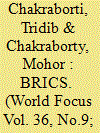

|
|
|
|
|
| Summary/Abstract |
The genesis of BRIC (Brazil-Russia-India-China, predecessor of present-day BRICS) as a multilateral grouping of the four developing or emerging economies can be traced back to September 2006, with the 61st Session of the United Nations General Assembly in New York, in a bid to explore measures of economic and political cooperation among the member-States. Officially, the organization came into existence in 2009, and with the inclusion of South Africa as the fifth member in April 2011, BRIC was re-christened BRICS. Till date, the BRICS member-states have held seven Summits and the latest in Ufa, Russia (July 2015) has been a watershed with the entry into force of the New Development Bank/BRICS Bank and the Contingent Reserves Arrangement. The BRICS Bank is heralded as an alternative to the World Bank-International Monetary Fund-led international economic architecture. However, it remains to be testified whether the BRICS Bank can evolve as a pulsating alternative to the WB-IMF-led financial system, though there is no way denying its establishment as a stepping stone for providing a predominantly South-South economic cooperative mechanism.
|
|
|
|
|
|
|
|
|
|
|
|
|
|
|
|
| 20 |
ID:
117026
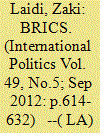

|
|
|
|
|
| Publication |
2012.
|
| Summary/Abstract |
The BRICS' impact can be evaluated based on the degree of political coherence among them, as well as their capacity to influence the international system. This article will from the outset assume that the BRICS form a heterogeneous coalition of often competing powers that share a common fundamental political objective: to erode Western hegemonic claims by protecting the principle which these claims are deemed to most threaten, namely the political sovereignty of states. The BRICS form a coalition of sovereign state defenders. While they do not seek to form an anti-Western political coalition based on a counter-proposal or radically different vision of the world, they are concerned with maintaining their independence of judgment and national action in a world that is increasingly economically and socially interdependent. They consider that state sovereignty trumps all, including, of course, the political nature of its underpinning regimes. Thus, the BRICS - even the democratic ones - fundamentally diverge from the liberal vision of Western countries.
|
|
|
|
|
|
|
|
|
|
|
|
|
|
|
|
|
|
|
|
|